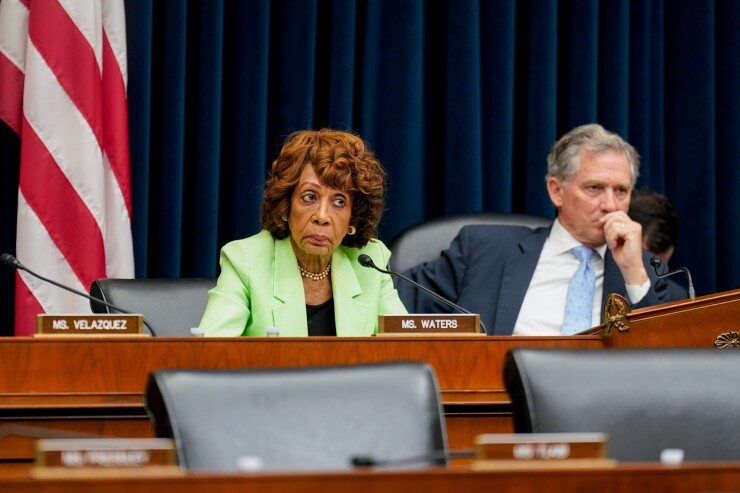
WASHINGTON — The House Financial Services Committee passed a number of banking bills handily, signaling future cooperation between Democratic and Republican lawmakers on a handful of key banking issues.
Republicans, despite controlling the White House and both chambers of Congress, maintain only narrow majorities in the legislature, meaning they still need Democratic support to pass major pieces of legislation that fall outside of the must-pass bill "reconciliation" process.
That means that many Republican policy priorities require Democratic buy-in, empowering several Democratic policymakers, like House Financial Services Committee ranking member Maxine Waters, D-Calif., to find areas of bipartisan consensus in which to exert influence.
The markup held by the House Financial Services Committee was a rare bipartisan event in the midst of a fiercely divided Washington. Elsewhere in the House, lawmakers are locked in debate about whether to vote to release more information about disgraced financier Jeffrey Epstein and the extent to which important figures in Washington, including President Donald Trump, are implicated in his crimes.
But the banking markup, which spanned Tuesday and Wednesday, saw a number of banking bills recommended favorably to the full House. Some of those bills were introduced by Democratic lawmakers, while others had bipartisan cosponsors — a feature that could signal early agreement between lawmakers of the two parties as House Republicans begin their campaign in earnest to roll back significant parts of Dodd-Frank.
One bill introduced by Waters addresses ways to get new banks, or de novo banks, to form. The bill passed unanimously, 49-0.
"I have seen firsthand how excessive capital and regulatory requirements have choked off new bank formation in rural communities," said Rep. Barry Loudermilk, R-Ga. "This bill [helps] de novo financial institution applicants have the necessary resources to grow sustainably and safely."
Waters' de novo bill emphasizes supporting minority depository institutions in a way that other versions of a de novo bill — such as the one
Another bill introduced by Rep. Monica De La Cruz, R-Fla., called Bringing the Discount Window into the 21st Century Act, passed 48-1. The bill would require the Federal Reserve Board to review the discount window and to improve its operations
While Waters didn't get as much Republican support on the idea of reforming deposit insurance in this hearing, elsewhere in Congress reforming deposit insurance for small businesses got a big nod.
On Tuesday, Jonathan McKernan, who was nominated to be the next undersecretary of the Treasury for domestic finance, told the Senate Finance Committee that he and Treasury Secretary Scott Bessent would be supportive of congressional efforts to change deposit insurance limits in some circumstances.
"The secretary has spoken on this and expressed a real interest in exploring an increase in the cap on deposit insurance for business, payment accounts, that would obviously require legislation, that would require congressional action," McKernan told Sen. Elizabeth Warren, D-Mass., during the confirmation hearing. "But I did recently discuss this issue with him. He's heard this issue over and over again from many, many community banks that he's met with inside the Treasury and outside the Treasury. The bottom line here is the secretary would be very eager to see legislation to that effect to move the cap up on deposit insurance for business and community banks."
To be sure, there's still a long road between the stirrings of bipartisan agreement and actual enactment of policy. Notably, any bills passed by the HFSC or even by the full House would need to be picked up and prioritized by the Senate — a tricky political prospect in any Congress, let alone a Trump-divided Washington.
"I'm pretty sure the big obstacle would be the Senate," said Ian Katz, a managing director at Capital Alpha Partners. "I understand the enthusiasm when a bill gets more bipartisan support than expected, but it's different when it goes to the Senate and is one step closer to actually becoming law."






